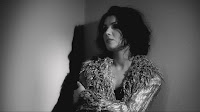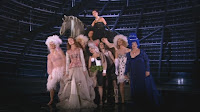Tuesday, 22 December 2009
Merry Christmas!
Sunday, 13 December 2009
Martinů:The Miracles of Mary, ND

Sunday, 15 November 2009
20th Anniversary of the Velvet Revolution
Wednesday, 21 October 2009
Meet... Cyprien Katsaris
Monday, 12 October 2009
Chopin's Death Mask in Prague
The Czech Republic is the first and, so far, the last country to welcome Frédéric Chopin's death mask. The year 2010 is to be named The Year of Chopin by UNESCO. At the gala concert, the Chopin Symphony Orchestra and Choir, conducted by the best Polish conductor Lukasz Borowicz, will play Mozart's Requiem - the composition that the Polish composer himself asked to be played at his funeral. Prague's St.Vitus Cathedral's bells and Warsaw's St.John's Cathedral's bells will sound at the same time.
Saturday, 10 October 2009
FruFru's Attitude towards Opera Productions
Wednesday, 7 October 2009
50 Years Since Mario Lanza's Demise
Tuesday, 6 October 2009
Jan Martiník: A New Hope for Czech Opera
['jan 'marciɲi:k] This young Czech bass at first wanted to study Medicine, like his father. Luckily, his talent was discovered when he was still at secondary school. Since then, he has been third at the Elena Obrazcova's competition in Moscow, a finalist of Operalia, and a winner of the Art Song Prize at the Cardiff Singer of the World competition.
Here's why:
Sunday, 20 September 2009
La Finta Gardiniera @The Estates Theatre: Mozart & Dwarves
Thursday, 17 September 2009
Interview with Dmitri Hvorostovsky on Vocal Technique
 - Thank you. I am interested in vocal literature. I have an entire library about it. But I haven’t had the time to read your book, because my father took it.
- Thank you. I am interested in vocal literature. I have an entire library about it. But I haven’t had the time to read your book, because my father took it.- He sings, too?
- Yes, he has a beautiful voice.
- As far as I can remember, about when I was three.
- And what voice did you have until the breaking?
- Normal, high, most probably soprano.
- Usually sopranos after the breaking transform into low voices.
- But I found a large range with very nice tenor top. My parents say it was a Lemeshev-like timbre.
- And how did you turn out as a baritone?
- When I came to the Krasnoyarsk Conservatory, Ekaterina Constantinovna Yoffel - my teacher - listened to me and said: "You are, without doubt, a baritone" - and led me as a baritone. In the third year I sang full baritone operatic repertoire in the theatre. My middle and lower register became stronger, baritone timbre, but I could not take the tenor top as freely as before.
- Do not regret! If you were a tenor, it is not known whether you would enjoy such a world-wide fame as you do today as the best baritone. After all, look what happens - at a concert in the Great Hall of the Academy the audience cheered you so much that they prompted you to sing an entire block of encores which was not on the program. I was listening to you already standing. But let's talk about the technique.
How do you imagine and feel your voice and its formation in your vocal apparatus, for example resonance?
- I can feel the vibration especially above the eyebrows, between eyebrows, around the nose, this "mask", as you know.
- And the chest resonance? Can you feel the connection of chest and head resonance?
- Chest, shoulders - all resonate. Like a column, resonating from the head, comes into the chest – such a feeling.
- When going to the top, what changes in your feeling of the resonance?
- Nothing in particular changes, because in the entire range and the lowest notes, I try not to lose the feeling of the mask, i.e. the upper resonator, and on the highest notes, to keep the chest resonance. Perhaps in the uppermost notes still noticeably the head sounds more. But in general, on all notes of the range, I use a mixed sound of the head and chest resonators.
- And on the transition notes?
- And on the transition notes - I have this "E" - "E-flat" - a mixed nature of sound, when both the upper and chest resonators sound, helps me to smooth out the registers.
Actually I have a feeling is that with the help of the resonance, it is possible to develop a force of sound that it will drown out the thunder of aircraft engines.
- And have you not tried?
- I have not tried to compete with a plane, but with the acoustics of the hall yes. At 35 years, when I began to sing in the big theatres in Europe and, especially, America, like the Metropolitan, I wanted to make my voice bigger, more powerful. And this is understandable - a huge hall provokes forcing. Your voice goes away from you and doesn’t return and to you it seems that you sing silently and should sing louder. But as a result I began to notice that I lose resonance and the ease of the voice, especially at the top. Yes, and transitional notes dropped a semitone, moved into the bass region - with the "E-flat" to "D".
- Yes, the forcing - the enemy of the resonance. How did you cope with this problem?
- It helped me that in our class – with E.K. Yoffel - we were accustomed to sing in muted acoustics. All the walls there were covered with drapery. You sing in the corridor - everything sounds great, but come to classroom – you can’t recognize your voice. As a result, I learned to sing focusing mainly on my internal feelings - both the resonator and the muscles.
After all, on the stage, especially in the opera, there are all draped sets, you’re wearing some plump costume, a huge hat absorbs all the high singing formant. Therefore, if you will rely solely on your ear, you will certainly force, and you’re ruined. But inner feeling, and in particular - resonator, here’s salvation. The singer has to be sure, - if the voice will be unforced, free and resonant, he does not fear any very "bad" acoustics, the voice will be flying and audible everywhere.
- Fine. Well, and how do you feel your singing breathing?
- The inhaling is short, very short. Yoffel used to say: "Breathe in the smell of a flower" - it definitely helps correct inhalation. But in order to have enough breath, the air consumption must be economical, very economical. This does not mean that you should hold your breath, no. It should be free and not forced on the larynx. The larynx should also be free, not tense, though lowered, as in yawn. This makes the oropharyngeal cavity larger and longer, and that’s good for the voice.
- And do you feel your vocal cords, do you try to manage them, when you sing?
- But for what? I read in Yudin, you probably know, he focuses on the vocal cords. As a student I tried to experiment with these cord sensations of tension and so on, but apart from damage to the voice, I didn’t get anything. We feel, control and regulate the work of breathing and resonators. This is important. But keep track of how your vocal cords work? No, no. It seems to me quite unnecessary.
But with the breathing and resonators we form some habits and then this all goes into the subconscious, in the automatism. And on stage I, of course, both breathe and resonate, as it should be - over that I keep some sort of control - but I think mostly about other things - how do I "paint" with my voice the emotional painting, the image, so that it is seen by each of my listeners.
The process of singing is not just a physical process, but also a psychological process. Therefore, the state of the singer’s soul is very important.
- When one listens and watches you on stage, they see how you show what you sing with all your body.
- This is Yoffel’s school. When I as a student began to unnaturally gesticulate, "help" myself with my hands (laughs), she halted it. And she taught to meaningfully express feelings with voice and behaviour. I am grateful to her. In addition, such natural "movement of the soul" helps as if to relax, to withstand the unnatural strain on the scene. And freedom of the body causes also, by the way, a resonating sound.
- Wonderful. And what are your preferences of other singers?
- How I turned out what I am – 50% of that comes from how much I listened and listen to other singers. I cultivated and cultivate my voice because of this.
- Your ideal? Which singer?
- From ours - it is P.G. Lisitsian - amazing, I mean the beauty of timbre and the vocal technique.
- You know, in the first edition of the book, in the section of computer spectra of the voices of masters of vocal art, I placed your spectra next to Lisitsian’s. So your voice can be compared in the basic parameters of high singing formant.
- Interesting! I will certainly look at it!
Published:
V.P. Morozov. The Art of Resonant Singing. M., 2008, pp.459-462
Wednesday, 16 September 2009
How I Came to Stop Worrying and Love Organ Music
A Message to Critics
Friday, 11 September 2009
Opera Trivia Quiz
Tuesday, 8 September 2009
100 Best Classical Recordings
Friday, 4 September 2009
Anna Netrebko's Video Blog
Wednesday, 2 September 2009
How to Become a Successful Opera Director
Tuesday, 1 September 2009
Il Trovatore in London, 2009
As Mostly Opera nicely put it: "So we are supposed to believe that the soprano kills herself to avoid sleeping with this guy? Right..."
Friday, 28 August 2009
Opera Singer Laryngoscope
This is what your vocal folds look like. The second part of the video, where it looks like slow motion, is called "laryngo-stroboscopy." Thus the laryngologist can see if the vocal folds open/close properly.
Thursday, 27 August 2009
The Best of Twitter re: Hvorostovsky

Kathrine_A: On my desktop there is now a lovely wallpaper of Dima Hvorostovsky. (Yes, I'm twelve.:) Though listening to Jussi Björling at the moment.
LLSi: Meninas, esqueçam Brad Pitt. Dmitri Hvorostovsky não é feio, além de ser um dos melhores cantores da atualidade. (Girls, forget Brad Pitt. Dmitri Hvorostovsky is not ugly, besides being one of the best singers of our time)
LutheranLucciol: Dmitri Hvorostovsky is coming to SF Opera! Hello, sexual sin. Some women actually go to hear his voice, too. (I'm joking....sort of).
Petruccl: Hvorostovsky rocks my world...
TiciaEvans:
Opera_is_Sexy @thaisinhafc Dmitri Hvorostovsky is such a Hottie! I have an #operacrush on him! lol
tommydavidson: Spent time with Dmitri Hvorostovsky. Arguably the world's greatest baritone. Believe my wife would have left me in 5 seconds for this dude
Stickolofogus has a HUGE crush on Dmitri Hvorostovsky. Like seriosly HUGE!
musicbizkid: I think today I'll listen to nothing but Dmitri Hvorostovsky singing "Ja vas lyublyu" That oughtta kill my ambition to make music ever again
Wednesday, 26 August 2009
20:13 CET: New Concert Coming Soon

Frufru is now watching this concert. It features some arie antiche and some bel canto arias. The young Dmitri Hvorostovsky is accompanied by the young Mikhail Arkadiev. As soon as Frufru finishes watching, she'll cut it and post it to YouTube.
Mario Lanza - L'alba separa de la luce l'ombra (Tosti)
My all-time favourite tenor sings an incredibly beautiful and sad Italian art song. It is even more sad when you consider that it was recorded only months before his untimely death.
L'ALBA SEPARA DALLA LUCE L'OMBRA
Francesco Paolo Tosti / Gabriele D'Annunzio
L'alba separa dalla luce l'ombra,
E la mia volutta' dal mio desire.
O dolce stelle, l'ora di morire.
Un piu' divino amor dal ciel vi sgombra.
Pupille ardenti, O voi senza ritorno
Stelle tristi, spegnetevi incorrotte!
Morir debbo. Veder non voglio il giorno,
Per amor del mio sogno e della notte.
Chiudimi,
O Notte, nel tuo sen materno,
Mentre la terra pallida s'irrora.
Ma che dal sangue mio nasca l'aurora
E dal sogno mio breve il sole eterno!
E dal sogno mio breve il sole eterno!
THE DAWN DIVIDES THE DARKNESS FROM LIGHT
The dawn divides the darkness from light,
And my sensual pleasure from my desire,
O sweet stars, it is the hour of death.
A love more holy clears you from the skies.
Gleaming eyes, O you who'll ne'er return,
sad stars, snuff out your uncorrupted light!
I must die, I do not want to see the day,
For love of my own dream and of the night.
Envelop me,
O Night, in your maternal breast,
While the pale earth bathes itself in dew;
But let the dawn rise from my blood
And from my brief dream the eternal sun!
And from my brief dream the eternal sun!
Monday, 24 August 2009
Opera Stars & Muppets
Friday, 21 August 2009
21st August: Heroes and Villains
Hvorostovsky's Ex's Solicitor Chosen "Lawyer of the Week"


Lawyer of the Week: "Michael Rowlands, a partner in Cripps Harries Hall, acts for Svetlana Hvorostovsky, the former wife of the opera singer Dmitri Hvorostovsky."
Thursday, 20 August 2009
Meet... The Countertenor

 With the use of falsetto, men can achieve a sound quite similar to that of castrati. When you get used to the pitch, you realize that the timbre is distinctly male, or at least not female. That's what gives the voice the quality that many people describe as "angelic." Some even prefer the countertenor to the female voices. However, falsetto is difficult to master, and only with a great amount of talent and hard work you can be a good countertenor.
With the use of falsetto, men can achieve a sound quite similar to that of castrati. When you get used to the pitch, you realize that the timbre is distinctly male, or at least not female. That's what gives the voice the quality that many people describe as "angelic." Some even prefer the countertenor to the female voices. However, falsetto is difficult to master, and only with a great amount of talent and hard work you can be a good countertenor.Wednesday, 19 August 2009
A Review of Netrebko's Videoclips from the DVD "The Woman, The Voice"


Joyce DiDonato: The Anti-Diva
Frufru is now going through Joyce DiDonato's web log and is getting the impression that Frufru is the most self-centered woman on earth. Not only does Ms.DiDonato possess a wonderful voice capable of some wild coloratura, but also is a beautiful person with a


















